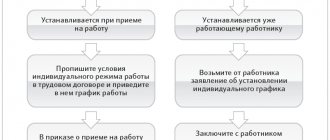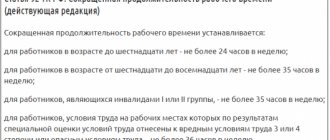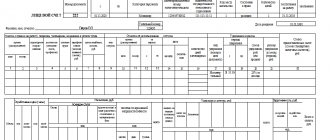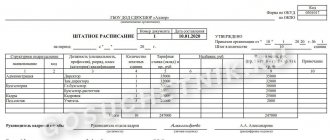Grounds and reasons
Article 76 of the Labor Code of the Russian Federation lists situations in which an employee is necessarily suspended from work:
state of intoxication (drug, alcohol, toxic);- the employee has not undergone training and knowledge testing on labor protection;
- lack of medical examination results;
- medical contraindications for performing work;
- suspension of a special permit or employee's right;
- requirement of authorized government bodies or officials (labor inspectorate, court, etc.);
- other cases mentioned in the current legislation.
Nuances of the grounds
Nuances when removing a foreign employee
The Labor Code establishes in Article 327.5 additional criteria, upon the occurrence of which the organization is obliged to remove a foreigner from work:
- Suspension of a permit issued to an organization to employ foreigners or expiration of its validity;
- Expiration of the validity period of a work permit in Russia or a patent;
- Completion of the period of validity of a temporary residence permit in the country;
- Completion of the period of validity of a residence permit in Russia;
- Completion of the validity period of a policy or voluntary health insurance agreement.
If one of the permits expires, the employer is obliged to formalize the removal of a citizen of a foreign country from work on a general basis.
Attention! The start date of the suspension will be the day after the day the document expires. If re-registration is not carried out within 1 month from the date of removal, then the employment contract is subject to termination on the basis of Art. 327.6 Labor Code of the Russian Federation.
Illegal removal
Procedure (registration of suspension from work)
How to formalize suspension from work? In many cases, the formalization of removal depends on the rules of the organization itself and the grounds. In some industries - transport, food, public catering - this procedure has been simplified.
If a circumstance is discovered that serves as a reason for preventing an employee from performing work duties, it is recorded in writing.
For this purpose, a memorandum or act is drawn up addressed to the manager. They are signed by the originator and witnesses.
According to the general rules, removal is issued in the form of an order or regulation; a unified form has not been developed for them. The document is signed by the head of the organization .
The order states:
the circumstances due to which such a need arose;- the period for which the employee is suspended (if this can be determined) or the action taken (for example, undergoing a medical examination);
- if necessary, who will perform the duties of the suspended person.
If it is necessary to quickly remove, for example, a drunk employee, a simplified procedure is used.
Then the removal occurs on the initiative of a medical service worker, based on data from a pre-trip examination, by direct management. But an order or instruction will still be required, since such a measure is usually associated with the cessation of payroll.
Pay does not always stop. If the circumstances due to which the employee was suspended were not his fault, accruals continue, but in the amount of 2/3 of earnings.
Sometimes there is a need for a temporary transfer, for which the personnel department looks for a vacant position.
A pregnant woman is removed from work for medical reasons if she needs easier work. She retains the average salary for her previous job.
Until feasible work is found for her, she can exercise her right to release. In this case, she also retains her average earnings.
sample order for dismissal from work.
Regulations under the Labor Code of the Russian Federation
In accordance with the provisions of the law, namely Art.
76 of the Labor Code of the Russian Federation, the head of an enterprise or the head of a department has every right to not allow an employee to perform direct duties if there is reason to believe that for some reason he will not cope with the assigned tasks, or circumstances have arisen that have become an obstacle to access to the worker place. In particular, an employee may be suspended in the following situations:
- appearing at the enterprise during working hours in a state of intoxication, both alcoholic and narcotic;
- those who have not passed a mandatory medical examination in accordance with the established rules specified in local acts or federal legislation;
- refusal or failure to complete training in occupational health and safety regulations;
- for medical reasons with an established ban on performing certain types of work or workload;
- suspension or cancellation of a license to perform certain types of work;
- if there is an order from authorized persons to remove the employee from performing duties.
If a worker is removed from work, no payment is made, because he does not fulfill his duties.
In exceptional cases, his average earnings may be retained, but only if there is evidence that the reason was the enterprise itself. The procedure for this action according to the Labor Code of the Russian Federation is discussed in the following video:
Illegal removal
In labor law, suspension from work may be illegal. This means every reason not provided for by law, or the absence of sufficient grounds.
According to the norms of the Labor Code, then the employer compensates his employee for lost earnings. He may also incur disciplinary liability - a fine, disqualification, suspension of activities.
Another comment to Art. 76 Labor Code of the Russian Federation
1. Suspension from work is the employer’s refusal to allow an employee to perform work on a job function stipulated by the employment contract.
The following features of removal from work emerge from the content of the commented article:
a) removal from work is carried out if there are grounds provided for by federal laws and other regulatory legal acts;
b) the employer is obliged to remove a person from work if there are grounds specified in the legislation;
c) suspension from work is carried out for the entire period until the circumstances that served as the basis for suspension are eliminated;
d) suspension from work suspends the performance of the parties’ obligations under the employment contract. The employee is released from the obligation to perform work according to a specified labor function, to go to work, to obey the internal labor regulations and from a number of other obligations arising from labor legislation, the terms of the collective agreement (agreement), local legal acts of the employer and the agreement of the parties. The employer, in turn, is released from fulfilling its obligations to the employee. During the period of suspension from work (preclusion from work), the employee, as a rule, is not paid wages.
2. The range of circumstances that constitute the basis for removal from work is determined by Part 1 of the commented article.
3. Appearing at work in a state of alcohol, drug or other toxic intoxication serves as grounds for removal from work, regardless of what time of the working day the employee appeared at work in this state.
The appearance of an employee at work in a state of intoxication is considered a gross violation of labor duties, which is the basis for bringing him to disciplinary liability, including dismissal. The fact that an employee appears at work in a state of intoxication must be properly certified and recorded, and dismissal must be carried out in the manner established for imposing disciplinary sanctions (see Article 193, subparagraph “b”, paragraph 6 of Article 81 of the Labor Code and commentary thereto) ).
4. The employer is responsible for training workers in safe methods and techniques for performing work on labor protection and providing first aid in case of accidents at work, instructing on labor protection, providing on-the-job training and testing knowledge of labor protection requirements, safe methods and techniques for performing work . The employer is obliged not to allow persons to work who have not undergone training and instructions on labor protection, internship and verification of labor protection requirements in accordance with the established procedure (see Articles 212, 225 of the Labor Code and the commentary thereto).
In turn, the employee is required to undergo training in safe methods and techniques for performing work on labor protection, providing first aid in case of accidents at work, instruction in labor protection, on-the-job training, testing of knowledge of labor protection requirements (see Article 214 of the Labor Code and commentary To her).
5. For the grounds and procedure for undergoing mandatory preliminary and periodic medical examinations, see Art. Art. 65, 69, 185, 212 - 214, 266, 298, 324, 328, 330.3, 348.3 TK and commentary thereto.
6. For contraindications identified in accordance with a medical report for performing work stipulated by an employment contract, see Art. Art. 73, 96, 224, 254, 298, 324, 328, 330.2, 331, 341 TK and commentary thereto.
7. As a basis obliging the employer to remove an employee, the commented article names the suspension of the special right for a period of up to two months, if this excludes the possibility of using the employee’s labor in accordance with the employment contract.
The suspension of a special right as interpreted by the legislator means two groups of circumstances:
1) Art. 3.8 of the Code of Administrative Offenses provides as a type of administrative punishment the deprivation of a special right previously granted to a person for a period of one month to three years. Execution of a decision on deprivation of a special right is carried out through the withdrawal in the prescribed manner of a document certifying the existence of this right. Upon expiration of the period for deprivation of a special right, documents confiscated from a person subjected to this type of administrative punishment are subject to return. The exception is cases where deprivation of a special right was imposed as an administrative punishment for violation of rules or regulations for the operation of tractors, self-propelled, road-building and other machines and equipment (Article 9.3 of the Code of Administrative Offences), as well as traffic rules (Chapter 12 of the Code of Administrative Offences) when the relevant documents are returned after checking the knowledge of the person who has been punished, the rules of the road, and in some cases - after a medical examination (Article 32.6 of the Code of Administrative Offenses);
2) suspension of a special right is possible not as a punishment for an employee committing an administrative offense, but upon the occurrence of other circumstances not related to the employee’s guilty actions. Accordingly, if this makes it impossible for the employee to fulfill his duties under the employment contract and the employee cannot be transferred with his consent to another job, and the period of suspension (deprivation) of the special right does not exceed two months, such employee is subject to suspension from work for this period. If the specified period exceeds two months, the employment contract with the employee may be terminated (see Article 83 of the Labor Code and commentary thereto).
In all of these cases, we are talking about termination of a license or suspension of special rights granted to employees. If the special right of an employer (legal entity or individual entrepreneur) is suspended or an administrative penalty is applied to them in the form of administrative suspension of activities (Article 3.12 of the Administrative Code), this is not a basis for removing employees from work (on the procedure for transferring to another job and terminating employment agreement in connection with the liquidation of an organization, termination of activities by an individual employer, reduction in the number or staff of employees, see Articles 72 - 72.2, 74, 81 of the Labor Code and commentary thereto).
8. The employer is obliged to remove from work (not allow to work) an employee at the request of bodies and officials authorized by federal laws and other regulatory legal acts.
On the rights of officials of bodies exercising state control (supervision) over compliance with labor legislation, see Art. Art. 357, 367, 368 Labor Code and commentary thereto.
By virtue of Art. 114 of the Criminal Procedure Code of the Russian Federation (hereinafter referred to as the Code of Criminal Procedure), if it is necessary to temporarily remove a suspect or accused from office, the investigator, with the consent of the head of the investigative body, as well as the investigator with the consent of the prosecutor, initiates a corresponding petition before the court at the place of the preliminary investigation. Within 48 hours. from the moment the petition is received, the judge makes a decision to temporarily remove the suspect or accused from office or to refuse it. A resolution on the temporary removal of a suspect or accused from office is sent to his place of work. The temporary suspension of a suspect or accused from office is canceled on the basis of a decision of the inquiry officer or investigator when the use of this measure is no longer necessary.
Removal from office as a measure of procedural coercion in its legal meaning is accompanied by such preventive measures as house arrest and detention. The application of these preventive measures, as in the case of removal from office, entails the suspension of the employment relationship.
In accordance with Art. 69 of Federal Law No. 127-FZ of October 26, 2002 “On Insolvency (Bankruptcy)”, the arbitration court removes the head of the debtor from office at the request of the temporary manager in case of violation of the requirements of this Law. When filing a petition with the arbitration court to remove the head of the debtor from office, the temporary manager is obliged to send copies of the petition to the head of the debtor, the representative of the founders (participants) of the debtor, and the representative of the owner of the debtor’s property - a unitary enterprise.
If the arbitration court grants the request of the temporary manager to remove the head of the debtor from office, the arbitration court issues a ruling to remove the head of the debtor and to assign the duties of the head of the debtor to a person nominated as a candidate for the head of the debtor by a representative of the founders (participants) of the debtor or another collegial management body of the debtor , a representative of the owner of the property of the debtor - a unitary enterprise, and if the indicated persons do not submit a candidacy for the acting head of the debtor - to one of the deputy heads of the debtor, in the absence of deputies - to one of the debtor's employees.
By virtue of Art. 13 of the Federal Constitutional Law of May 30, 2001 N 3-FKZ “On a State of Emergency”, the decree of the President of the Russian Federation on the introduction of a state of emergency may provide, among other measures and temporary restrictions, the removal from work for the period of the state of emergency of state leaders, and in certain cases conditions - and non-governmental organizations in connection with their improper performance of their duties and the appointment of other persons to temporarily perform the duties of these managers.
9. Suspension of the performance of duties within the framework of the employment relationship during removal from work, as a general rule, is expressed in the fact that the employee is not paid wages. However, the legislation provides for a number of exceptions to the general rule.
First of all, by virtue of Part 3 of the commented article, in cases of suspension from work of an employee who has not undergone training and testing of knowledge and skills in the field of labor protection or a mandatory preliminary or periodic medical examination through no fault of his own, he is paid for the entire time of suspension from work as for downtime (see Article 157 of the Labor Code and commentary thereto).
In a number of cases, a person suspended from work is paid other compensation (insurance) payments instead of wages. Thus, persons who are carriers of infectious disease agents and who are suspended from work due to this are paid social insurance benefits (Article 33 of the Federal Law of March 30, 1999 No. 52-FZ “On the Sanitary and Epidemiological Welfare of the Population”).
Persons temporarily removed from office as a measure of procedural coercion have the right to a monthly state benefit in the amount of the subsistence level of the working population as a whole in the Russian Federation.
Arbitrage practice
If an employee does not agree with the employer’s decision and considers it illegal, he has the right to go to court.
What the plaintiff (employee) can demand:
- recognition of the illegality of the order;
- recovery of lost wages, average earnings, amounts for downtime that occurred due to the fault of the employer;
- reinstatement (if the suspension was followed by dismissal);
- changes to the entry in the work book if he was fired;
- compensation for moral damage and reimbursement of expenses for defense services.
Experience has shown that if an employer makes mistakes in the removal procedure, then the likelihood of winning the case in court is quite high.
Occupational Safety and Health
According to Art. 76 of the Labor Code of the Russian Federation there are several cases when the employer is simply obliged to remove the employee from the work performed. Unfortunately, such a procedure is not regulated by labor legislation and very often causes some difficulties for personnel officers. The following article will tell you in detail about exactly under what circumstances the employer is obligated to remove an employee from work, and how to properly document this.
According to Art. 76 of the Labor Code of the Russian Federation there are several cases when the employer is simply obliged to remove the employee from the work performed. Unfortunately, such a procedure is not regulated by labor legislation and very often causes some difficulties for personnel officers. The following article will tell you in detail about exactly under what circumstances the employer is obligated to remove an employee from work, and how to properly document this.
According to labor law, suspension from work is a temporary measure and does not entail a change or termination of the employment contract, but in some cases it may precede the dismissal of an employee. In such a case, registration plays a very important role, because if such a fact is correctly documented, then in the event of a labor dispute, it will save the employer from many problems associated with improper registration. In Art. 76 of the Labor Code of the Russian Federation contains several grounds on which an employer can remove an employee from work. Below we will look at each of them.
1. The employee is in a state of drug, alcohol or other toxic intoxication.
The employer can and must suspend any employee from work if he appears at the workplace in a state of drug, alcohol or other toxic intoxication and cannot properly perform his job duties. It should be noted that the period of suspension is not established by law. The Labor Code only indicates that the employer can suspend an employee from work for that period of time until the circumstances that served as the basis for exclusion from work or removal from work are eliminated.
Since the appearance of an employee at the workplace in a state of alcoholic intoxication is considered a gross violation of labor discipline, in such cases the employer can apply any disciplinary punishment provided for by labor legislation, and even dismissal. To avoid labor disputes in the future, first of all, the fact that an employee appears in a drunken state should be properly documented. In paragraph 42 of the Resolution of the Plenum of the Supreme Court of the Russian Federation dated March 17, 2004 N 2 “On the application by the courts of the Russian Federation of the Labor Code of the Russian Federation” it is emphasized that the state of drug or alcohol or other toxic intoxication can be subjected not only to medical reports, but also to other types of evidence, which must be assessed accordingly by the court.
To begin with, in order to record the fact of intoxication of an employee, it is necessary to draw up a report in the presence of at least two witnesses. There are no special requirements for drawing up such an act, but there are several recommendations. Firstly, a personnel employee or any official of the organization who holds a position not lower than the head of a structural unit has the right to draw up acts of this kind. The most important thing in this matter is to describe in as much detail as possible all the signs of intoxication, for example, lack of coordination of movements, the strong smell of alcohol on the breath, inappropriate behavior, etc.). If intoxication is of a narcotic or other toxic nature, then the following signs may include: dilated pupils, pallor, increased excitability, etc. As a rule, the act must be signed by the person who drew it up and two witnesses present at the same time. Next, the drunk employee is introduced to the contents of the drawn up report and asked to give an explanation of the reasons that prompted him to appear in such a state at the workplace. If he is physically unable or refuses to explain himself, then a note about this is made on the act, which is also certified by the signature of witnesses. After drawing up such a report, the employee is required to be removed from work and sent for a medical examination.
It should be remembered that any employee, by virtue of Art. 33 Fundamentals of the legislation of the Russian Federation on the protection of the health of citizens dated July 22, 1993 N 5487-1 has the right to refuse a medical examination.
As a rule, a medical examination is carried out in healthcare organizations that have a license to carry out this type of activity, indicating the name of services and work. In accordance with the Temporary Instruction “On the procedure for medical examination to establish the fact of alcohol consumption and intoxication” and the Methodological Instructions approved by the USSR Ministry of Health on September 02, 1988 N 06-14/33-14, the medical institution issues a conclusion in which the fact of consumption of alcohol or other substance which caused intoxication, not only states, but also qualifies the condition of the subject, for example:
- sober;
- the fact of alcohol consumption has been established, but signs of intoxication have not been identified;
- alcohol intoxication;
- alcoholic coma;
- a state of intoxication caused by narcotic or other substances;
- sober, but there are some functional impairments, due to which it is necessary, for health reasons, to remove the employee from work with a source of increased danger.
In order for a specialist to determine whether a person being examined can perform a particular job, it is necessary, when preparing a medical report, to inform the doctor about the work that this employee performs at the workplace. If the fact of alcohol consumption has been established, but no signs of intoxication have been identified, then the employer will have no grounds for dismissal from work.
For how long should an intoxicated employee be suspended from work? The answer to this question largely depends on the well-being and degree of intoxication of the employee. Typically, drunk employees are suspended from work for a shift or for one working day, and, as a rule, the next day they can begin to perform their work duties. Moreover, his absence from work cannot be regarded as absenteeism, because he still showed up for work.
2. The employee did not undergo training and testing of skills and knowledge in the field of labor protection in the prescribed manner
Each manager and employee, in accordance with the requirements of Art. 225 of the Labor Code of the Russian Federation must undergo training in accordance with Resolution of the Ministry of Labor of Russia and the Ministry of Education of Russia dated January 13, 2003 N 1/29 “On approval of the Procedure for training in labor protection and testing knowledge of labor protection requirements for employees of the organization.” The responsibilities of workers in the field of labor protection are established in Art. 214 of the Labor Code of the Russian Federation. For example, they must undergo training in safe methods and techniques for performing work and providing first aid to victims at work, instruction in labor protection, testing of knowledge of labor protection requirements, and on-the-job training. And the employer, according to the provisions of Art. 212 of the Labor Code of the Russian Federation, is obliged to conduct such training for workers, including the necessary briefings (introductory, primary, repeated, targeted, unscheduled), and also record them in standard journals in accordance with GOST 12.0.004-90 “System of occupational safety standards. Organization of occupational safety training. General provisions" of knowledge on them.
It follows from this that if an employee has not completed training in the field of labor protection, then the employer is obliged to remove him from work (paragraph 3, part 1, article 76 of the Labor Code of the Russian Federation). For how long? As a rule, the employee should be suspended from work for the period necessary to provide training and proper testing of occupational safety knowledge. If an employee for some reason avoids a re-inspection, he can be suspended from work for a longer period (for example, three months, because the organization carries out planned training and testing of knowledge in the field of labor protection in accordance with the schedule ) or conduct individual training and knowledge testing and allow him to work if the result is positive.
3. The employee did not undergo examination (mandatory medical examination) or psychiatric examination in accordance with the established procedure
In Art. 213 of the Labor Code of the Russian Federation establishes that workers engaged in heavy work, work with dangerous or harmful working conditions must undergo mandatory medical examination at the expense of the employer (Order of the Ministry of Health and Social Development of Russia dated August 16, 2004 N 83) (this also includes underground work) and work related to traffic. Such employees are required to undergo preliminary medical examinations upon entering work, and periodic examinations in order to determine the suitability of their health status for the work assigned. It should be noted that in order to prevent the spread and occurrence of diseases and protect public health, periodic and preliminary medical examinations should be carried out by employees of child care institutions, water supply facilities and enterprises:
- treatment and prophylactic;
- public catering and trade;
- Food Industry.
In addition to the Labor Code, the obligation to undergo a preliminary medical examination is established by a number of other federal laws, for example:
- Art. 6 of Federal Law No. 77-FZ of April 14, 1999 “On departmental security” (in relation to private security workers);
- Art. 14 Federal Law No. 76-FZ of 05/02/1997 “On the destruction of chemical weapons” (personnel of facilities for the storage and destruction of chemical weapons);
- Art. 9 of Federal Law No. 38-FZ of March 30, 1995 “On preventing the spread in the Russian Federation of the disease caused by the human immunodeficiency virus (HIV infection)” in accordance with the List approved by the Government of the Russian Federation No. 877 of September 4, 1995 for workers of certain professions, enterprises, industries, organizations and institutions that must undergo mandatory medical examination;
- Art. 23 Federal Law No. 29-FZ of 01/02/2000 “On the quality and safety of food products”;
- Art. 23 of Federal Law N 151-FZ of August 22, 1995 “On emergency rescue services and the status of rescuers.”
The procedure for conducting periodic and preliminary medical examinations and examinations of workers who are engaged in hazardous work and work with dangerous and (or) harmful production factors is established by Appendix 3 to Order No. 83.
Periodic and preliminary medical examinations (examinations) of employees, in accordance with clause 5 of this Procedure, must be carried out only by medical organizations that have a license for this type of activity. As a rule, the commission is approved by the head of such an organization. Moreover, its chairman should only be an occupational pathologist or a doctor of another specialty, but necessarily having professional training in occupational pathology, and members of the commission should only be specialists who, within the framework of their specialty, have been trained in occupational pathology. The commission, taking into account the specifics of current production factors and medical contraindications to the continuation or implementation of work on the basis of current regulatory legal acts, determines the volume and types of necessary research.
The employer determines the contingents and draws up a list of persons who are subject to periodic medical examinations, indicating production facilities, workshops, areas, hazardous or harmful production factors, and, after agreement with Rospotrebnadzor, two months before the start of the examination, sends this list to the medical organization.
The medical commission, after properly conducting the necessary examinations and examinations, enters its conclusion and an extract from the employee’s outpatient card into the card of periodic and preliminary medical examinations. Within 30 days, the medical organization is obliged to provide the report to the employer, the occupational pathology center and the territorial body of Rospotrebnadzor. The employer, based on the information presented in the medical institution’s report, must make a decision to remove from work or not allow (upon employment) a particular employee to work.
Speaking about a psychiatric examination for performing activities associated with a source of increased danger and certain types of professional activities, it, according to Art. 6 of the Federal Law of July 2, 1992 N 3185-1 “On psychiatric care and guarantees of the rights of citizens during its provision” must be carried out without fail. The rules for passing such an examination are approved by Decree of the Government of the Russian Federation of September 23, 2002 N 695, according to which it can be carried out only on a voluntary basis and in order to determine the suitability of an employee for mental health reasons to carry out certain types of activities, to work in conditions of increased danger, provided for by the List of Medical psychiatric contraindications for carrying out certain types of professional activities and activities associated with a source of increased danger (Approved by Resolution of the Council of Ministers of the Government of the Russian Federation of April 28, 1993 N 377).
It should be remembered that the concept of sources of increased danger is not disclosed in labor legislation, so for clarification you should refer to Art. 1079 of the Civil Code of the Russian Federation, which refers to the use of transport mechanisms, means, nuclear energy, high voltage electrical energy, potent poisons, explosives, etc.; carrying out construction and other related activities, etc.
An employee can be suspended from work due to failure to undergo a periodic or preliminary examination or psychiatric examination only until the relevant examination has been completed.
Determination of contraindications for performing work specified in the employment contract
An employee must be released from work specified in the employment contract if contraindications for its performance are identified based on the results of a medical report issued in the manner established by federal law or other regulatory legal acts of the Russian Federation. This point is indicated in para. 5 tbsp. 76 of the Labor Code of the Russian Federation.
According to the Constitutional Court in Ruling No. 357-О-О dated May 29, 2007, release from work is carried out to protect the health of the employee and is one of the guarantees of the right to work in conditions that meet hygiene and safety requirements. Having received a medical report from the employee about contraindications for performing the work specified in the employment contract, the employer is obliged to transfer the employee to another appropriate job that is not contraindicated for his health. According to the provisions of Art. 73 of the Labor Code of the Russian Federation, this must be done with the written consent of the employee.
If the employer does not have relevant work, as well as if the employee refuses to transfer, the employer must release the employee from work, while maintaining the place of work and position for the period specified in the medical document (no more than four months). No wages are accrued during this period. The exception is cases provided for in the Labor Code of the Russian Federation, other federal laws, labor or collective agreements and agreements.
If it is necessary to temporarily transfer an employee to another job for a period of more than four months or transfer on a permanent basis, according to clause 8 of Part 1 of Art. 77 of the Labor Code of the Russian Federation, if the employee refuses to transfer, the employment contract terminates. If heads of organizations or various structural divisions, deputy managers, as well as chief accountants need to be suspended from work according to a medical report, then with their written consent, instead of terminating the employment contract, the period can be determined by agreement of both parties.
During suspension from work, wages are not accrued. Exceptions are cases provided for by the Labor Code of the Russian Federation, other federal laws, as well as labor or collective contracts and agreements.
Suspension for a period of up to two months of the validity of the employee’s special right
Special employee rights include: the right to drive a vehicle, a license, the right to carry a weapon. In case of suspension of the employee’s special right for a period of up to two months, as a result of which he loses the ability to perform his duties under the employment contract, and which prevents the employee from being transferred (with written consent) to another appropriate job, he is subject to release from work. It is the employer's responsibility to offer all relevant vacancies available in the local area and, if so agreed by collective bargaining agreements or agreements, in other areas.
If the period of suspension of special rights is more than two months or the employee is deprived of rights on a permanent basis, then if it is impossible to transfer the employee to another job under clause 9 of Part 1 of Art. 83 of the Labor Code of the Russian Federation, the employment contract is terminated.
In case of suspension of the special right of an employer who is a legal entity, individual entrepreneur, etc. or the application of administrative punishment to him under Art. 3.12 of the Code of Administrative Offenses of the Russian Federation - suspension of activities; employees are not suspended from work.
Removal of employees from performing work at the request of officials or bodies authorized by federal laws and other regulatory legal acts of the Russian Federation
At the request of officials and bodies authorized by federal laws and other regulatory legal acts of the Russian Federation, the employer must remove employees from performing work. Officials include inspectors of the state labor inspectorate. According to Art. 357 of the Labor Code of the Russian Federation, the State Labor Inspectorate inspector has the right to put forward a demand for the removal from work of an employee who has not completed occupational safety training, instruction and testing of knowledge on labor protection, as well as on-the-job training.
The right to file a demand for temporary suspension from work also belongs to the chief state sanitary doctors, as well as their deputies. According to Art. 51 of Federal Law No. 52-FZ of March 30, 1999 “On the Sanitary and Epidemiological Welfare of the Population”, employees who are carriers of pathogens of infectious diseases that can become spreaders of infection are subject to temporary suspension from work.
The authorized body is the court, which, according to Art. 114 of the Criminal Procedure Code of the Russian Federation, if there is a petition from the investigator and the consent of the prosecutor, he may demand the temporary removal of an employee from office if the latter is suspected of committing a crime. In this case, the employer is sent a document with a requirement to remove the employee from work and is subject to mandatory execution.
Upon receipt of the relevant document with a requirement to remove an employee from performing work, the employer is obliged to carefully check whether the person or body is authorized to issue such a requirement. It is also necessary to pay attention to the content of the letter. If it is advisory in nature and not an order, if it contains a request and not a strict instruction, the employer is free to make the decision to release the employee from work.
Other reasons for removing an employee from work, stipulated by laws and other regulatory legal acts of the Russian Federation
Any reasons for removing an employee from work must be enshrined in laws or other regulatory legal acts of the Russian Federation. The employer does not have the right to independently formulate reasons for removing employees from work and enshrine them in regulatory documents.
Documentation of an employee's removal from work As a rule, the reasons for removing an employee from work are identified by the employee's immediate supervisor, who is obliged to inform the employer about this through a report or memo.
Art. 76 of the Labor Code of the Russian Federation does not provide strict recommendations for documenting removal from work. It is best to draw up a document in the form of an order or instruction on the organization’s letterhead. A written document will help avoid disputes and discrepancies with the employee. In addition, documented suspension from work guarantees the accuracy of wage calculations.
In the absence of a specific form for the removal order, it is desirable that the document contain the following information:
- the circumstances that caused the dismissal from work;
- information about documents serving as the basis for removal;
- period of suspension;
- instructions from the accounting department on the form of wages.
If an employee refuses to familiarize himself with the order to remove him from work, a corresponding act should be drawn up in the mandatory presence of two or more witnesses.
When registering a suspension under Art. 76 of the Labor Code of the Russian Federation, an employee is not obliged to give an explanation of the reasons that led to his removal, however, it is still advisable to indicate them in the document. This is in the interests of the employee himself. If it is not his fault that he is removed from work, then his wages are paid as if he was idle (for example, if he did not undergo safety training and an occupational safety knowledge test for reasons beyond his control).
After the end of the period of suspension of an employee from work, the question invariably arises of how to document his admission to work and whether this needs to be done by issuing a separate document.
If difficulties arise in determining the exact date of the end of the employee’s suspension from work, or it depends on the time of elimination of the reasons that caused it, it is necessary to issue an order for admission. In this case, permission to work is issued in a separate document. If the order of suspension already contains the exact date of its end, there is no need to issue a separate permit. The suspension order terminates automatically.
If it is necessary to suspend not just one, but a separate group of employees (most often this happens when some of the employees have not undergone a mandatory medical examination or have not undergone training and knowledge testing on labor protection), you can issue the suspension in the form of a group order, indicating the reason in it suspensions and names of suspended employees.
The question often arises whether the employer himself can decide not to suspend an employee from work if there are reasons for this. The answer to this question is categorical. If there is a reason for suspension from work, the employer is obliged to do this; he does not have the right to take responsibility and not suspend the employee from work. It does not matter how valid the reason for suspension is, even if the reason is insignificant, the employee should be suspended for a short period, and when this reason is eliminated, he should be allowed to work again.
However, the employer must act strictly in accordance with the law. If the dismissal from work is considered illegal, then in accordance with Art. 234 of the Labor Code of the Russian Federation, the employer will have to pay the employee the wages he did not receive. In addition, the period of illegal removal is counted towards the length of service, which, according to Art. 121 of the Labor Code of the Russian Federation gives the right to annual paid leave.
Payment for suspension from work
During the period of suspension from work or exclusion from work, the employee is not paid wages. The exception is cases provided for in the Labor Code of the Russian Federation or other federal laws.
If an employee was suspended from work through no fault of his own (did not undergo occupational safety and health training or a mandatory medical examination for reasons beyond his control), he is paid wages for the entire period of suspension as if he was idle. Payment for downtime, according to Art. 157 of the Labor Code of the Russian Federation is carried out as follows: through the fault of the employer - at least 2/3 of the average salary of the employee, through the fault of the employee - without payment of wages. If the downtime did not depend on one or the other party, wages are calculated in the amount of at least 2/3 of the tariff rate or salary, which is calculated in proportion to the downtime period.








